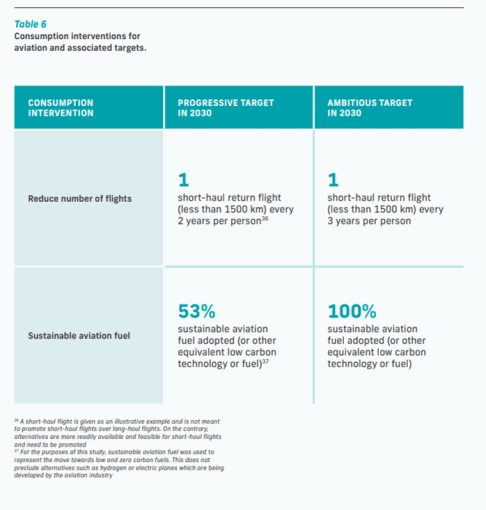|
Getting your Trinity Audio player ready...
|
A report published in 2019 and re-emphasised in 2023 recommends that by 2030 we will not be permitted to eat meat or dairy products, we will be limited to three items of new clothing per year and one aeroplane flight every three years. It will start in countries that “consume the most.”
Let’s not lose touch…Your Government and Big Tech are actively trying to censor the information reported by The Exposé to serve their own needs. Subscribe now to make sure you receive the latest uncensored news in your inbox…
Published in 2019, ‘The Future of Urban Consumption in a 1.5°C World’ report sets out targets for cities to reduce greenhouse gas emissions, as consistent with the 2015 Paris Agreement ambitions. What this report aims to do is quantify and then suggest ways for city “leaders” to reduce consumption-based emissions. In other words, reduce what you and I consume be it food, clothes or travel etc.
The place to start, a press release stated, is with those who consume the most and “consumption-based emissions must be cut by at least 50% by 2030.”
The report outlines six sectors where the world’s cities can take “rapid action to address consumption-based emissions”: food, construction, clothing, vehicles, aviation, and electronics.
Related:
- UK local governments are declaring a “climate emergency” and forming committees to implement dystopian plans
- Council claims it is a “Victim of Abuse” following new Policy to enforce Climate Lockdowns without consent of the Public
- 15-minute cities: Councils are attempting to remove our freedoms, take control of our lives and herd us into spaces they completely control
The Future of Urban Consumption in a 1.5°C World was co-created and co-delivered by C40, Arup and the University of Leeds with funding from Arup, University of Leeds and Citi Foundation. It claims to be an analysis and not a plan but the tone of the report, from the outset, reads like a plan. The foreword stated:
“The report demonstrates that mayors have an even bigger role and opportunity to help avert climate emergency than previously thought … While the analysis addresses big global questions, its purpose is to inspire practical action … average consumption-based emissions in C40 cities must halve within the next 10 years. In our wealthiest and highest consuming cities that means a reduction of two thirds or more by 2030.” – Mark Watts, Executive Director of C40
“It is now clear that action to reduce consumption will be necessary as part of the global effort to mitigate climate change … The actions set out in the report are challenging and they will be confronting for many, but we think they are necessary … City Mayors can set a vision and convene actors to bring about the changes we describe … The work reported here forces a focus on what a sustainable urban future might look like and helps us to consider what policies, regulations, incentives and behavioural changes will be necessary to transition to a zero-carbon world.” – Gregory Hodkinson, Former Chairman of Arup
The Future of Urban Consumption in a 1.5°C World, 2019
C40 is a global network of mayors representing one-quarter of the global economy. It includes almost 100 cities plus 1,143 cities and local governments that have joined C40’s ‘Cities Race to Zero’. The cities that sign up for the ‘Cities Race to Zero’ commit, among others, to keeping global heating below the 1.5°C goal of the Paris Agreement.

Without reading the numerous reports and recommendations thrown at the ‘Cities Race to Zero’ signatories, it’s not possible to establish if the actions set out in The Future of Urban Consumption in a 1.5°C World report are specifically included in the action plan. Why does it matter? Because if they are, it is not only the 100 or so C40 Cities but more than 1,000 cities that are committing to the report’s reductions in consumer-based emissions. Additionally, we can assume Arup’s network is committing the same.
Arup works as a global network of “experts” and boasts that it “shapes cities in a thousand ways.” It has more than 17,000 members and offices in 46 of the 97 cities that make up C40’s global network. C40 and Arup have worked together since 2009 and have collaborated on dystopian publications such as Deadline 2020, Green and Thriving Neighbourhoods and a guide for creating net-zero neighbourhoods. But these collaborations have not come about without money changing hands.
The first C40/Arup report titled ‘Powering Climate Action: Cities as Global Changemakers’ was published in 2015. That same year Arup committed to investing $1 million over three years into a research partnership with C40.
In 2019, the year the C40/Arup consumer-based emissions report The Future of Urban Consumption in a 1.5°C World was published, Arup trebled its advisory support to C40 to $3 million over 3 three years.
In 2023, Arup continued its investment in C40 with up to US$300,000 a year to help C40 drive resilience and decarbonisation in cities around the world. Unsurprisingly, in March 2023, C40 Cities re-highlighted the 2019 C40/Arup consumer-based emissions report in an article titled ‘A spotlight on consumption-based emissions’. “Since our report was published, cities around the world have begun to map consumption-based emissions and explore ways to reduce them,” C40 said.
So, what does the 2019 report that Arup has so heavily invested in say?
Below we have picked out a few highlights. You can download and read the full report HERE. Because it provides damning evidence against its collaborators, we have also attached a copy below should it disappear from public view at any time in the future.
Starting on page 66, the report summarises what they hope to impose on us. Below are images of their “ambitions” which require no further comment, except to say that all these plans are being made and agreed upon outside the democratic process and in a classic dictatorial manner under false pretences.





C40 and Arup’s activities need to be halted immediately and their operations shut down permanently. Additionally, any person who has actively contributed to/participated in devising, considering or implementing these plans should be questioned, investigated and brought to account.
So, who are the people who feel they can autocratically override fundamental freedoms and remove inalienable rights while destroying our well-being, livelihoods, economies and societies? Some of their names are provided in an “acknowledgement” section at the beginning of the report:
| Project Team | Specialist input |
| C40 Tom Bailey, Markus Berensson, Rachel Huxley | C40 Mark Watts, Kevin Austin, Shannon Lawrence, Andrea Fernández, Michael Doust, Josh Alpert, Josh Harris, Emily Morris, Sophie Bedcecarré Ernst, Donna Hume, Zachary Tofias, Stefania Amato, Ricardo Cepeda-Márquez, Kathrin Zeller, Zoe Sprigings, Paul Cartwright, Caroline Watson, Anna Beech, Milag San Jose-Ballesteros, David Miller, Laura Jay, Stelios Diakoulakis, Hastings Chikoko, Pengfei Xie, Divyaprakash Vyas, Daniel Robinson, Caterina Sarfatti, Julia Lipton, Charlotte Breen |
| Arup Ben Smith, Kristian Steele, Christina Lumsden, Christopher Pountney, Stephanie Robson, Ewan Frost-Pennington, Ethan Monaghan-Pisano, Francesca Poli, Anna Lawson, Maria Sunyer Pinya, Jaspreet Singh, Ben Ashby | Arup Will Cavendish, Carol Lemmens, Alexander Jan, Stephen Cook, Richard Boyd, Orlando Gibbons, Michael Muller, Christine McHugh, Tim Armitage, Joe Wheelwright, Emily Woodason, Giacomo Magnani, Erato Panayiotou, Allen Hogben, Jack Clarke, Simon Hart, Andrew Lawrence |
| University of Leeds John Barrett, Andrew Gouldson, Joel Millward-Hopkins, Anne Owen | Other organisations Miranda Schnitger (Ellen MacArthur Foundation), Maja Johannsen (Ellen MacArthur Foundation), Richard Waites (World Resources Institute), Graham Earl (Ecolyse), Arianna Nicoletti (Future Fashion Forward e.V), John Dulac (International Energy Agency), Thibaut Abergel (International Energy Agency), Tiffany Vaas (International Energy Agency), Mikael Linnander (EAT Forum), Dabo Guan (University of East Anglia), Julian Hill-Landolt (World Business Council for Sustainable Development |
| Third Party Reviewers Klaus Hubacek, University of Maryland, Emma Stewart, World Resources Institut |

The Expose Urgently Needs Your Help…
Can you please help power The Expose’s honest, reliable, powerful journalism for the years to come…
Your Government & Big Tech organisations
such as Google, Facebook, Twitter & PayPal
are trying to silence & shut down The Expose.
So we need your help to ensure
we can continue to bring you the
facts the mainstream refuse to…
We’re not funded by the Government
to publish lies & propaganda on their
behalf like the mainstream media.
Instead, we rely solely on our support. So
please support us in our efforts to bring you
honest, reliable, investigative journalism
today. It’s secure, quick and easy…
Just choose your preferred method
to show your support below support

Categories: Breaking News, World News


























[…] and it was brought in by Boris Johnson, Michael Bloomberg and Carlos Moreno in 2004 under the C40 cities international organisation of which Sadiq Khan is now the […]
[…] and it was brought in by Boris Johnson, Michael Bloomberg and Carlos Moreno in 2004 under the C40 cities international organisation of which Sadiq Khan is now the […]
[…] By 2030 you will not eat meat and you will be allowed only three items of new clothing a year, report says – A report published in 2019 and re-emphasised in 2023 recommends that by 2030 we will not be permitted to eat meat or dairy products, we will be limited to three items of new clothing per year and one aeroplane flight every three years. It will start in countries that “consume the most.”https://expose-news.com/2023/06/18/by-2030-you-will-be-allowed-only-three […]
[…] and it was brought in by Boris Johnson, Michael Bloomberg and Carlos Moreno in 2004 under the C40 cities international organisation of which Sadiq Khan is now the […]
[…] [3] The infamous ‘The Future of Urban Consumption in a 1.5°C World’ was co-created and co-delivered by C40, Arup and the University of Leeds with funding from Arup, University of Leeds and Citi Foundation. See By 2030 you will not eat meat and you will be allowed only three items of new clothing a year, repor… […]
[…] des städtischen Konsums in einer 1,5 Grad Welt – C40 Städte Bericht“ findet man in einem Artikel auf The Exposé vom 22. Juni. Im Konzept werden die den einzelnen Maßnahmen zugeordneten CO2 […]
[…] des städtischen Konsums in einer 1,5 Grad Welt – C40 Städte Bericht” findet man in einem Artikel auf The Exposé vom 22. Juni. Im Konzept werden die den einzelnen Maßnahmen zugeordneten CO2 […]
[…] des städtischen Konsums in einer 1,5 Grad Welt – C40 Städte Bericht“ findet man in einem Artikel auf The Exposé vom 22. Juni. Im Konzept werden die den einzelnen Maßnahmen zugeordneten CO2 […]
[…] Konsums in einer 1,5 Grad Welt – C40 Städte Bericht" findet man in einem Artikel auf The Exposé vom 22. Juni. Im Konzept werden die den einzelnen Maßnahmen […]
[…] städtischen Konsums in einer 1,5 Grad Welt – C40 Städte Bericht“ findet man in einem Artikel auf The Exposé vom 22. Juni. Im Konzept werden die den einzelnen Maßnahmen zugeordneten […]
[…] By 2030 you will not eat meat and you will be allowed only three items of new clothing a year, repor… A report published in 2019 and re-emphasised in 2023 recommends that by 2030 we will not be permitted to eat meat or dairy products, we will be limited to three items of new clothing per year and one aeroplane flight every three years. It will start in countries that “consume the most.” […]